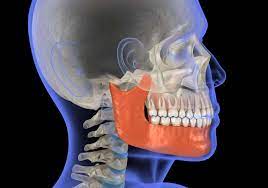TMJ Placement Injury

TMJ placement injury means that something is wrong with the joint connecting your jaw to your skull. It can happen because of an injury, too much stress on the joint, arthritis, or problems with how your jaw lines up.
Physiotherapy is a way to help with TMJ placement injuries. A physiotherapist who knows about TMJ problems can use different methods to make you feel better and help you move your jaw properly again. Here are some things they might do:
- Hands-on treatment: The physiotherapist may use their hands to move and stretch your jaw joint, muscles, and tissues around it. This can help reduce pain, make the joint move better, and relax tight muscles.
- Exercises for your jaw: The physiotherapist might show you special exercises to strengthen and stretch the muscles in your jaw. Doing these exercises can make your jaw stronger, help it move better, and make sure it lines up correctly.
- Posture and how you move your body: The way you sit or stand and how you move your body can affect your TMJ. The physiotherapist can teach you how to have good posture and use the right movements when you eat, talk, or sleep.
- Ways to manage pain: There are different ways to help with the pain caused by TMJ problems. The physiotherapist might use heat or cold therapy, special machines, or techniques to relax your body and reduce pain.
- Teaching and helping you take care of yourself: It’s important to understand what’s happening with your TMJ and learn how to manage it on your own. The physiotherapist can teach you about your condition, suggest changes to your lifestyle, and show you exercises to do at home.
- Using a special device: In some cases, the Doctor of physiotherapist in Dwarka might recommend a device to wear in your mouth. It can help stabilize your jaw joint and relieve symptoms. They might work with a dentist or orthodontist to make this device and check that it’s working well.
This can happen if you had an accident or if you use your jaw too much. It can also be because your jaw doesn’t line up correctly or if you have arthritis.
During physiotherapy, the therapist will use their hands to gently move and stretch your jaw joint. They might also massage the muscles around your jaw to make them feel better. This can help to reduce the pain and make your jaw move more easily.
The physiotherapist in Janakpuri they will teach you exercises that you can do at home to make your jaw stronger and more flexible. These exercises might involve opening and closing your mouth, moving your jaw from side to side, or doing gentle stretches. By doing these exercises regularly, you can make your jaw muscles stronger and your jaw more stable.
Sometimes, the way you sit or stand can affect your TMJ. The physiotherapist will show you how to have good posture and move your body in a way that doesn’t hurt your jaw. They might suggest using pillows or special supports to help you keep a good posture while sleeping.
If your jaw is hurting, the physiotherapist can use different methods to help with the pain.
The physiotherapist will also give you information about your condition. They’ll explain why your TMJ is hurting and tell you what you can do to take care of it. They might say to avoid hard or chewy foods, find ways to relax and reduce stress, and keep your mouth clean.
Physiotherapy takes time, and you might not feel better right away. But if you keep doing the exercises and following the advice from the physiotherapist, you can start to feel less pain and move your jaw better.
If your jaw is bothering you or you think you have a TMJ placement injury, talk to a healthcare professional or a physiotherapist who knows about these problems. They can check what’s wrong and help you with the right physiotherapy treatments
Comments
Post a Comment